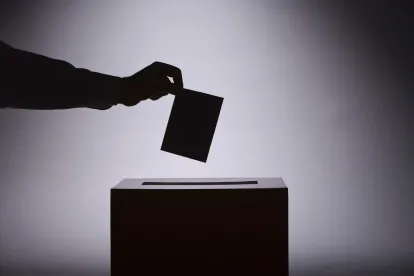2023 is neither a presidential nor mid-term election year but nevertheless there are extensive efforts underway across the country to combat a host of recent measures meant to restrict the right to vote. The Bloomberg and Proskauer communities recently came together at Bloomberg’s headquarters in New York for a discussion highlighting those efforts, addressing the health of our democracy, and presenting a call to action for the hundreds who attended this lunchtime event.
Moderated by Bloomberg reporter Greg Farrell, the speakers included Casey Smith, an Equal Justice Works Fellow funded by Bloomberg and Proskauer who works for the ACLU’s Voting Rights Project, and Godfre Blackman, a Proskauer associate who recently served as the firm’s NAACP Legal Defense Fund (LDF) Fellow, which enabled him to work directly with the LDF on various voting rights issues.
Here are some of the efforts restricting the right to vote around the country that were discussed during the event:
Georgia: The Georgia Legislature passed Senate Bill 202 in 2021, a nearly 100-page voter law that restricts absentee voting and makes voting more burdensome, especially for voters of color, people with disabilities, and other historically disenfranchised communities. Along with other civil rights groups, the ACLU has challenged this legislation in court under the Voting Rights Act, the Americans with Disabilities Act, and the Rehabilitation Act. (For more information see AME Church v. Kemp).
Florida: In 2018, Florida voters passed a constitutional amendment enabling citizens with felony convictions to have their right to vote automatically restored, but in response, the Legislature passed a law requiring people to pay all the fines and fees they owe before they could regain their voting rights. Now, Florida is prosecuting individuals for registering to vote or voting while ineligible; most of those prosecuted are Black Floridians who believed they were eligible to vote. Florida has no centralized system for people to find out what they owe in legal fines and fees, so it is impossible for many to even know whether they are eligible. In many cases, Florida even encouraged the person to vote, and then later prosecuted them for doing so. These prosecutions intimidate even eligible voters from trying to register or vote. (For more information see 10 Reasons Courts should Toss Florida’s Flimsy Voter Fraud Prosecutions.) Florida’s voter registration form also does not tell voters with a prior felony conviction the eligibility requirements, even though federal law requires states to provide that kind of information on voter registration forms. The LDF and ACLU are challenging Florida’s form in federal court. (For more information see LWV Florida v. Byrd NVRA Lawsuit.) In addition, the LDF worked to introduce and support bills that would create a statewide system where returning citizens could determine their eligibility to vote and would also create affirmative defenses to crimes of voter fraud in instances where the state had evidence of someone’s ineligibility to vote and either failed to notify the person or affirmatively sent voter registration cards. Unfortunately, that effort has not yet been successful.
The state of Florida also passed a law adversely impacting community-based voter registration organizations. Among other things, the legislation reduced the timeframe for these organizations to submit registration and increased maximum fines to $250,000. Of note here, Black and Latino voters are twice as likely to register to vote through community-based registration organizations as white voters.
Texas: In 2016, Crystal Mason had no idea that Texas considered her to be ineligible to vote due to a prior felony conviction. She filled out and submitted a provisional ballot, but later, she was arrested for illegal voting and then sentenced to five years in prison. The ACLU is appealing her conviction. In 2022, the Texas Court of Criminal Appeals ordered the lower court to review her conviction, saying that law required the state to show Ms. Mason actually knew she was ineligible to vote in 2016. The lower court heard arguments in April 2023, where Ms. Mason’s lawyers from the ACLU argued the state didn’t have enough evidence to prove Ms. Mason knew that the state considered her ineligible.
Mississippi: In 2023, Mississippi’s legislature passed Senate Bill 2358, a law that makes it a crime for anyone other than certain family members, “caregivers,” election officials, or postal workers to return someone’s ballot. The law deters friends, neighbors, and staff members from institutions like long-term care facilities or jails from helping people return their ballots, even though the federal Voting Rights Act allows people with disabilities to get assistance with voting from anyone they choose. The ACLU, the Southern Poverty Law Center, and the Mississippi Center for Justice, representing the League of Women Voters of Mississippi and Disability Rights Mississippi, filed a lawsuit challenging the law in May 2023. (For more information see Lawsuit challenges bill that blocks most Mississippians from helping friends, neighbors deliver absentee ballots.)



 />i
/>i

